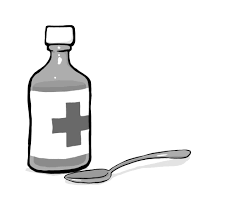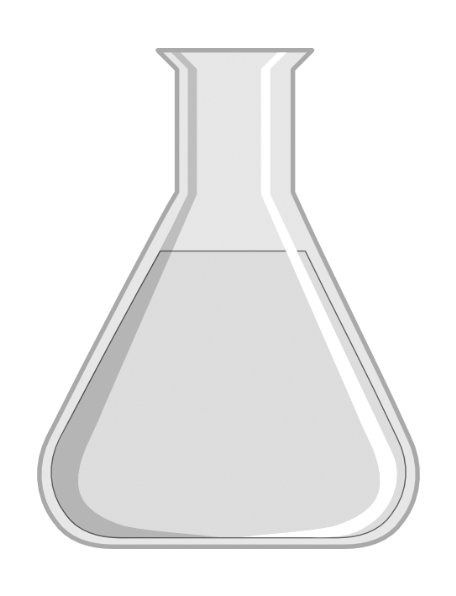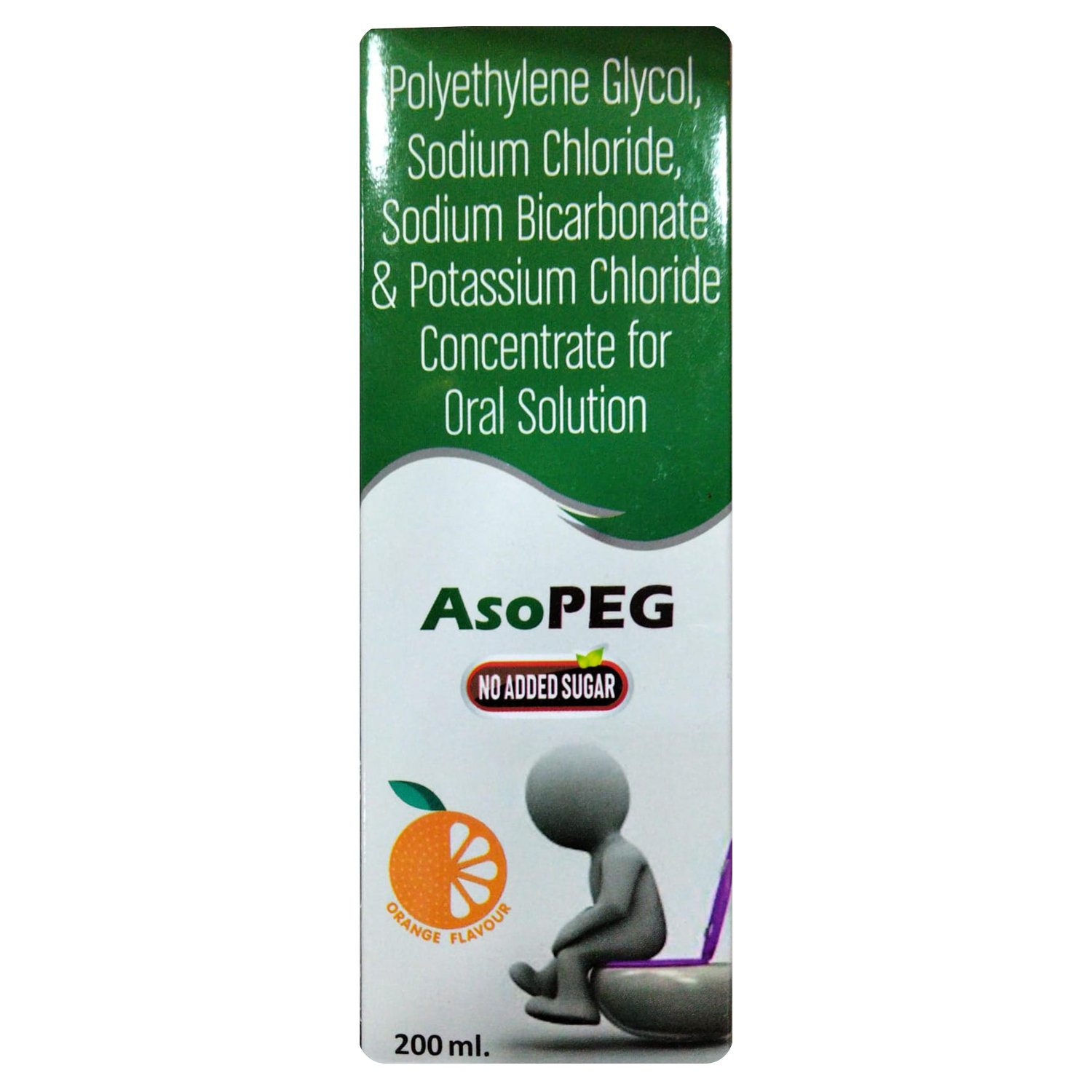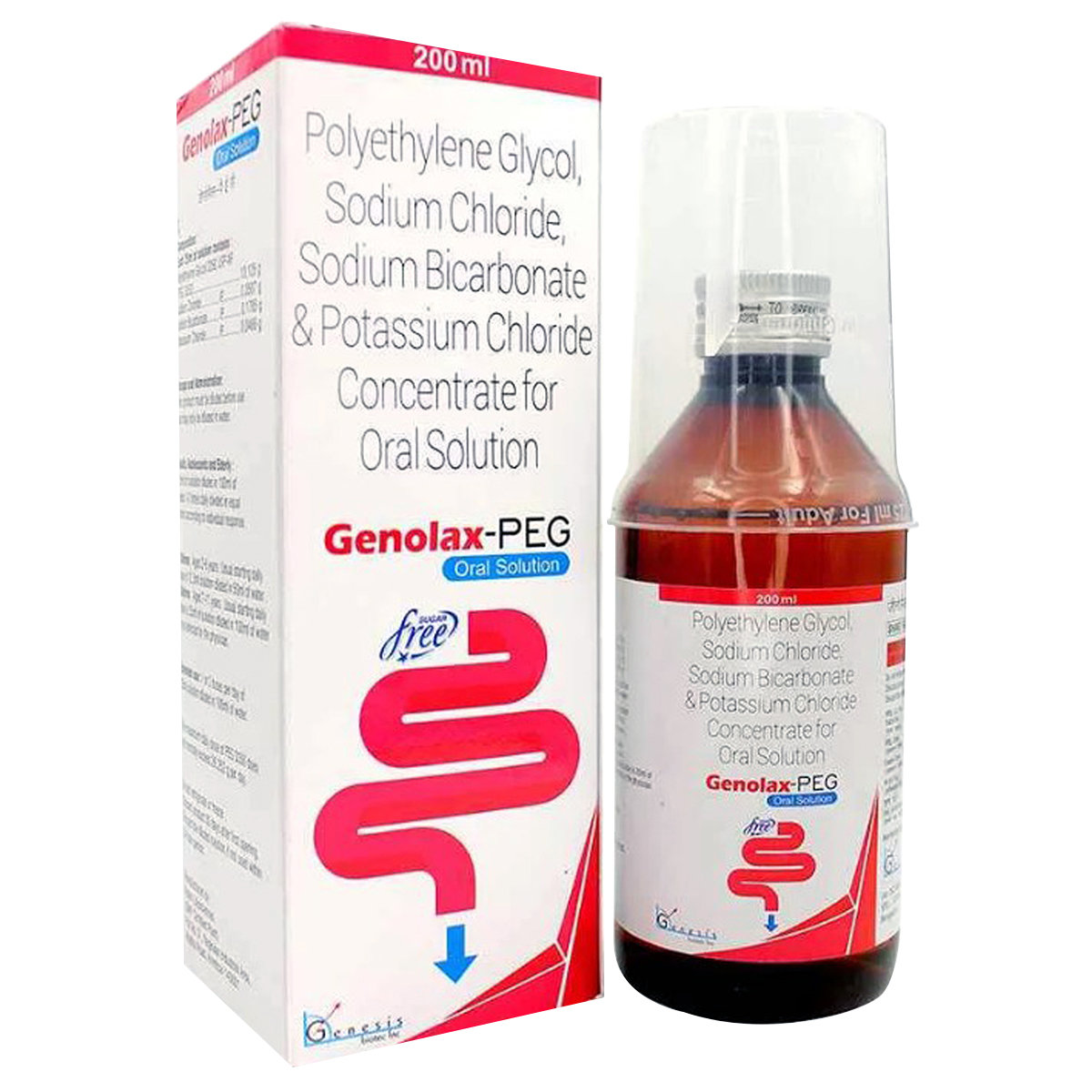Polyethylene Glycol+potassium Chloride+sodium Bicarbonate+sodium Chloride
About Polyethylene Glycol+potassium Chloride+sodium Bicarbonate+sodium Chloride
Polyethylene Glycol+potassium Chloride+sodium Bicarbonate+sodium Chloride belongs to a class of drugs called laxatives, used to treat constipation. Constipation refers to infrequent bowel movements in which the stools are often dry, painful, and hard to pass.
Polyethylene Glycol+potassium Chloride+sodium Bicarbonate+sodium Chloride contains Polyethylene glycol, Potassium chloride, Sodium bicarbonate, and Sodium chloride. Polyethylene Glycol+potassium Chloride+sodium Bicarbonate+sodium Chloride works by drawing water into the intestine, softening stools, and making them easier to pass. It also helps replenish electrolytes.
In some cases, you may experience stomach pain, indigestion, mild diarrhoea, nausea, or vomiting. Most of these side effects of Polyethylene Glycol+potassium Chloride+sodium Bicarbonate+sodium Chloride do not require medical attention and typically resolve on their own over time. However, if the side effects persist or worsen, please consult your doctor.
If you are allergic to Polyethylene Glycol+potassium Chloride+sodium Bicarbonate+sodium Chloride or any other medicines, please tell your doctor. Polyethylene Glycol+potassium Chloride+sodium Bicarbonate+sodium Chloride is not recommended for children below 12 years of age. If you are pregnant or breastfeeding, please consult a doctor before taking Polyethylene Glycol+potassium Chloride+sodium Bicarbonate+sodium Chloride.
Uses of Polyethylene Glycol+potassium Chloride+sodium Bicarbonate+sodium Chloride
• Constipation relief: Polyethylene Glycol+potassium Chloride+sodium Bicarbonate+sodium Chloride helps retain water in the colon to soften stools and ease bowel movements.
• Bowel cleansing: Polyethylene Glycol+potassium Chloride+sodium Bicarbonate+sodium Chloride used before medical procedures like colonoscopy to effectively clear the intestines.
Medicinal Benefits
- Polyethylene Glycol+potassium Chloride+sodium Bicarbonate+sodium Chloride is a combination of Polyethylene glycol, Potassium chloride, Sodium bicarbonate, and Sodium chloride. It is primarily used to relieve constipation and promote comfortable bowel movements.
- Polyethylene glycol works by drawing water into the intestines, softening the stools, and cleansing the gastrointestinal tract, making stool passage easier.
- Potassium chloride supports the healthy functioning of muscles, nerves, and organs, maintaining electrolyte balance.
- Sodium bicarbonate helps neutralise excess stomach acid, providing relief from acidity, bloating, and heartburn.
- Sodium chloride aids in maintaining proper sodium and fluid balance in the body.
- Polyethylene Glycol+potassium Chloride+sodium Bicarbonate+sodium Chloride helps in softening stools, easing bowel movements, restoring electrolyte balance, and relieving constipation effectively.
Directions for Use
- Polyethylene Glycol+potassium Chloride+sodium Bicarbonate+sodium Chloride can be taken with or without food, or as advised by your doctor.
- Follow your doctor's instructions on the dosage and timing of this medication.
- Check the label for directions. Dilute Polyethylene Glycol+potassium Chloride+sodium Bicarbonate+sodium Chloride with water as advised by your doctor. Take it orally using the measuring cup provided with the package.
- Shake the bottle well before each use.
Storage
Side Effects of Polyethylene Glycol+potassium Chloride+sodium Bicarbonate+sodium Chloride
- Stomach pain
- Indigestion
- Mild diarrhoea
- Nausea
- Vomiting
Drug Warnings
- If you are allergic to Polyethylene Glycol+potassium Chloride+sodium Bicarbonate+sodium Chloride or any other medicines, please tell your doctor.
- If you have ulcerative colitis or Crohn’s disease, inform your doctor before taking Polyethylene Glycol+potassium Chloride+sodium Bicarbonate+sodium Chloride.
- Polyethylene Glycol+potassium Chloride+sodium Bicarbonate+sodium Chloride is not recommended for children below 12 years of age.
- If you are pregnant or breastfeeding, please consult a doctor before taking Polyethylene Glycol+potassium Chloride+sodium Bicarbonate+sodium Chloride.
- Drink plenty of fluids while taking Polyethylene Glycol+potassium Chloride+sodium Bicarbonate+sodium Chloride.
- Do not take Polyethylene Glycol+potassium Chloride+sodium Bicarbonate+sodium Chloride in more than the recommended doses.
- Discard Polyethylene Glycol+potassium Chloride+sodium Bicarbonate+sodium Chloride after 30 days of first opening the bottle.
Drug Interactions
Drug-Drug Interaction: Polyethylene Glycol+potassium Chloride+sodium Bicarbonate+sodium Chloride may interact with anticonvulsants (phenytoin, carbamazepine).
Drug-Food Interaction: No interactions found.
Drug-Disease Interaction: If you have faecal impaction (hardened stool stuck in the colon or rectum due to chronic constipation), blockage in the intestine, a perforated gut wall, toxic megacolon (widening of the large intestine), ulcerative colitis or Crohn’s disease, inform your doctor before taking Polyethylene Glycol+potassium Chloride+sodium Bicarbonate+sodium Chloride.
Drug-Drug Interactions Checker List:
Safety Advice

Alcohol
consult your doctorThe interaction of alcohol with Polyethylene Glycol+potassium Chloride+sodium Bicarbonate+sodium Chloride is unknown. Please consult a doctor before consuming alcohol while using Polyethylene Glycol+potassium Chloride+sodium Bicarbonate+sodium Chloride.

Pregnancy
cautionPlease consult a doctor if you are pregnant. Polyethylene Glycol+potassium Chloride+sodium Bicarbonate+sodium Chloride is given to pregnant women only if the doctor thinks the benefits outweigh the risks.

Breast Feeding
cautionPlease consult a doctor if you are breastfeeding. Polyethylene Glycol+potassium Chloride+sodium Bicarbonate+sodium Chloride is given to breastfeeding mothers only if the doctor thinks the benefits outweigh the risks.

Driving
safePolyethylene Glycol+potassium Chloride+sodium Bicarbonate+sodium Chloride usually does not affect your ability to drive or operate machinery.

Liver
cautionTake Polyethylene Glycol+potassium Chloride+sodium Bicarbonate+sodium Chloride with caution, especially if you have a history of Liver diseases/conditions. The dose may be adjusted by your doctor as required.

Kidney
cautionTake Polyethylene Glycol+potassium Chloride+sodium Bicarbonate+sodium Chloride with caution, especially if you have a history of Kidney diseases/conditions. The dose may be adjusted by your doctor as required.

Children
cautionPolyethylene Glycol+potassium Chloride+sodium Bicarbonate+sodium Chloride is not recommended for children under 12 years of age, as its safety and effectiveness have not been established.
Habit Forming
Diet & Lifestyle Advise
- Try maintaining a balanced diet, which includes fresh fruits and vegetables.
- Stay hydrated by drinking enough water and fluids.
- Exercise regularly, and stay fit.
- Get enough sleep.
- Eat food rich in fibre, such as whole-wheat bread, oatmeal, flaxseed, nuts, beans, lentils, fruits (berries, apples, oranges, bananas, pears, figs), and vegetables (broccoli, spinach, sweet potatoes, avocados).
Patients Concern
Disease/Condition Glossary
Constipation: It refers to infrequent bowel movements in which stools are often dry, painful, and hard to pass. Constipation is a condition in which a person has fewer than three bowel movements in a week. However, bowel patterns may vary from person to person. Symptoms include bloating, abdominal pain, and the feeling that bowel movements are incomplete. Constipation occurs when the large intestine's normal muscle contractions slow down, which causes the incomplete elimination of waste from the body. Constipation can be associated with a sudden change in diet, a diet low in fibre, insufficient fluid intake, and a lack of physical activity.
FAQs
Polyethylene Glycol+potassium Chloride+sodium Bicarbonate+sodium Chloride belongs to a class of drugs called laxatives, used to treat constipation.
Polyethylene Glycol+potassium Chloride+sodium Bicarbonate+sodium Chloride contains Polyethylene glycol, Potassium chloride, Sodium bicarbonate and Sodium chloride. Polyethylene glycol draws water into the intestine and softens stools, making it easier to pass. Potassium chloride is essential for the healthy functioning of organs. Sodium bicarbonate works by neutralising high levels of acid in the stomach, helping to treat acidity and heartburn. Sodium chloride maintains sodium levels in the body. Together, Polyethylene Glycol+potassium Chloride+sodium Bicarbonate+sodium Chloride helps in relieving constipation.
Polyethylene Glycol+potassium Chloride+sodium Bicarbonate+sodium Chloride may cause mild diarrhoea as a side effect at the beginning of the treatment. It usually gets better by reducing the amount of Polyethylene Glycol+potassium Chloride+sodium Bicarbonate+sodium Chloride intake. However, if the condition persists or worsens, please consult a doctor.
You are not recommended to take Polyethylene Glycol+potassium Chloride+sodium Bicarbonate+sodium Chloride with anticonvulsants as it may reduce the effectiveness of anticonvulsants (medicines for epilepsy). However, please consult your doctor before taking Polyethylene Glycol+potassium Chloride+sodium Bicarbonate+sodium Chloride with other medicines.
You are recommended to avoid foods that are high in fat and low in fibre, such as ice cream, red meat, frozen meals, potato chips, cheese, hot dogs and hamburgers.
You are not recommended to take more than the advised dose of Polyethylene Glycol+potassium Chloride+sodium Bicarbonate+sodium Chloride as it may cause excessive diarrhoea that might lead to dehydration. If you have diarrhoea, stop taking Polyethylene Glycol+potassium Chloride+sodium Bicarbonate+sodium Chloride and drink plenty of fluids to avoid dehydration. However, if the condition persists or worsens, please consult a doctor.
Available Medicines for
Polyethylene Glycol+potassium Chloride+sodium Bicarbonate+sodium Chloride

Ezepeg Sugar Free Orange Flavour Oral Solution 200 ml
1 Bottle
₹274.1 (MRP 304.5)10%Off
cashback: 0

Giveit Sugar Free Saunf & Cardamom Oral Solution 200 ml
1 Bottle
₹307.8 (MRP 342)10%Off
cashback: 0







